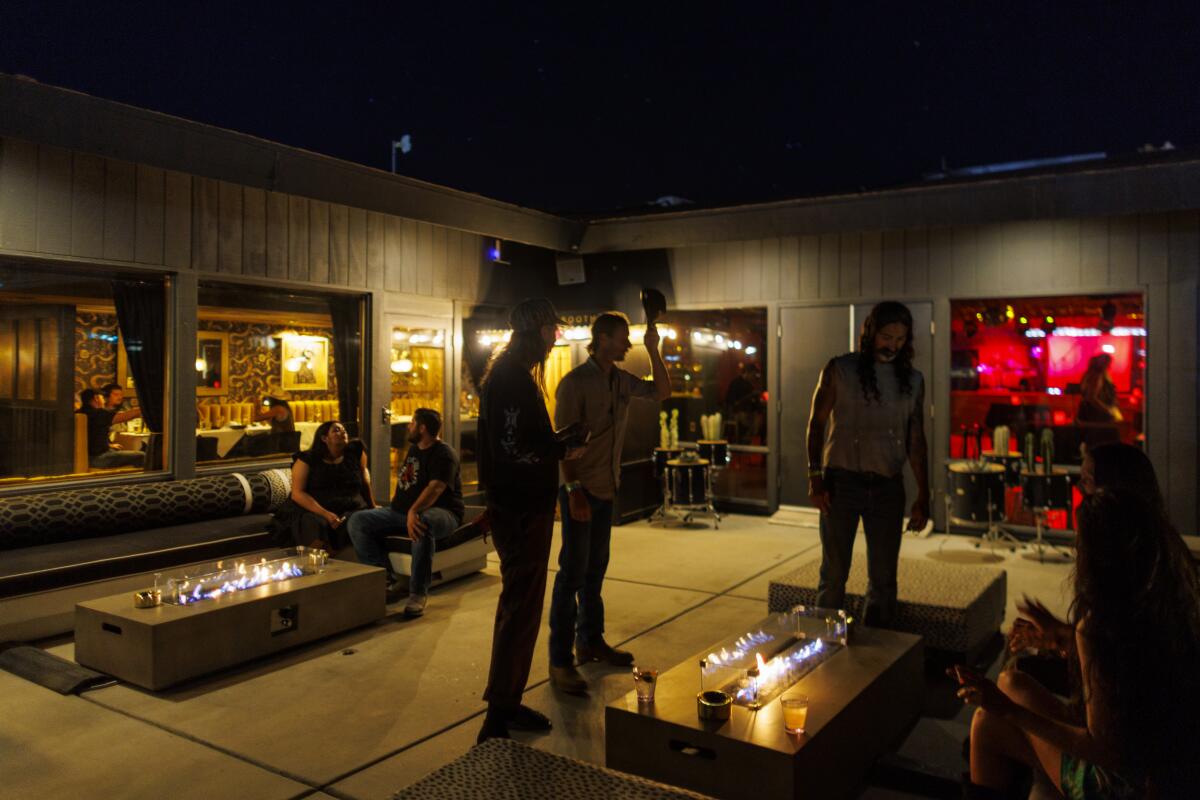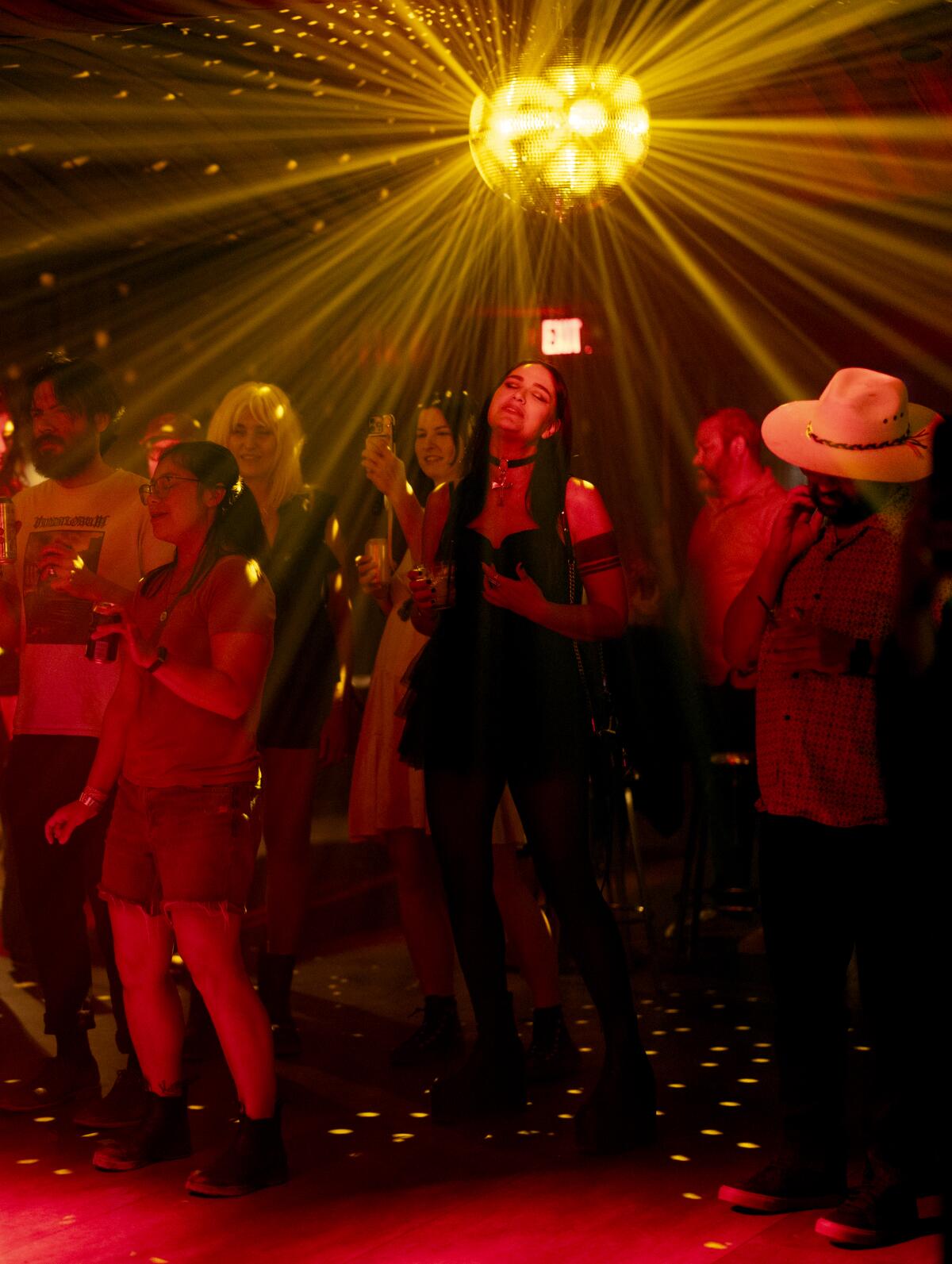Out on the moody, flame-licked front patio of Mojave Gold in Yucca Valley, Ryan and Alexis Gutierrez took in their first goth show in their new neighborhood.
The couple had just moved to the high desert from the Inland Empire, and given the considerable face tattoo count between them, they’d been looking for some witchy fellow travelers.
After watching the electro project Tantra Punk’s set — a singer marauding across the stage, fogged over with blood-colored lights — the couple passed by a merch booth hawking fresh herbs planted in tiny metal pots. The two were pleasantly surprised they’d found their people here.
“I didn’t even know there was a scene for this out here,” Alexis said. “I literally just passed this place and thought it looked hip. We used to drive to San Diego for something like this.”
“It’s kind of slower out here in the desert, but there’s things like this that make it fun,” Ryan said, “Being in the alternative scene, having shows like this is really important to us.”
The six-week-old Mojave Gold is the most promising new entry in a desert music scene that, lately, has seen its share of high-stakes ownership drama at venues like Pappy & Harriet’s and the Alibi. Mojave Gold’s owners are betting on a more permanent, independent-minded scene for local acts and edgier nightlife in its wake.
“A part of why we moved here 10 years ago was that there are so many amazing musicians, and a lot more people live here now,” said the venue’s co-owner Cooper Gillespie. “I’m like, ‘Yes, bring on all the amazing music venues and new places for the music community to be.’”
The bar inside the nightclub is decorated in gold colors at Mojave Gold, a brand new music venue near Joshua Tree that’s counting on a continued interest in year-round nightlife in the fast-gentrifying area.
(Gina Ferazzi / Los Angeles Times)
While Joshua Tree is famous for its rough-and-tumble (if sometimes set decorated) roadhouse aesthetic, Mojave Gold looks more like it zigged left up the 111 from Palm Springs. A black and gilt disco vibe permeates the 500-capacity space, from the undulating wood ceiling made from salvaged Hollywood Bowl seats to velveteen booths and a winking poster advertising Quaaludes.
“There’s a purposeful make-out corner,” said Mojave Gold’s interior designer Brookelyn Fox, wryly arching her eyebrows toward the rear of the venue.
Mojave Gold’s attached restaurant is worth a visit in its own right (a cactus and citrus ceviche, charred cauliflower steak and a chocolate mole custard looked especially eye-catching). But in a small town with an outsize presence on the region’s music scene, it could help turn the area into a year-round tour stop in its own right and become a new festival-season mainstay.
“If you’ve got all these bands playing Coachella every year, well, only one of them is going to be able to play Saturday night at Pappy’s,” said Dale Fox, who manages the venue’s financing. “Now, there’s another place.”
Landers residents Gillespie and her Mojave Gold co-founder Greg Gordon are both former Pappy’s employees, working under longtime owners Robyn Celia and Linda Krantz. They suspected there was room for more live music than that beloved and hotly contested venue could handle year-round. They had their eyes on the former AWE Bar space since it closed after a brief run in 2023, with ambitions to rebuild it into a locals-first venue.

Patrons gather in the outdoor patio adjacent to the nightclub at Mojave Gold.
(Gina Ferazzi / Los Angeles Times)
“The space and the time we’ve had is so much more than we could have done in L.A.” Gillespie said. “Everything takes a lot of time and money in the city, and out here, I feel like there’s a lot more space in all aspects of your life to create. We’ll have national acts, but also bring up our local talent and give them opportunities to have a place to call their own.”
They got lucky when Liz Garo, the talent buyer for the late, lamented Alibi in Palm Springs, was unexpectedly free and looking for a new project in the area after decades booking the Echo, Regent and other venues in Los Angeles. The shows so far have spanned the modern desert’s full range of scenes — country dance nights, the scuzzy punk of Throw Rag, cabaret drag acts and gothic folk from Blood Nebraska.
“It was a part of some music scenes where you didn’t even know who’s playing, but you went to the Echo because you knew all your friends were going to be there,” Gillespie said. “That’s what we want this place to be.”
Mojave Gold arrives as a new crop of nightlife spots have opened to serve both desert lifers and newcomers to the small towns near Joshua Tree National Park. The Red Dog Saloon, Más o Menos and the ad hoc gay bar Tiny Pony Tavern have found their footing for more ambitious desert nightlife. There’s still room for more, Gordon said.
“The big surprise for me when we opened, is that there was not one moment where I felt a sense of competition,” Gordon added. “None of the other restaurants or venues had this kind of cutthroat mentality. There’s no zero-sum thinking. I think we’re still so young out here that … everybody adds something to the market.”

Patrons dance to music from local artists on Desert Gothic night at Mojave Gold.
(Gina Ferazzi / Los Angeles Times)
But passions about development run deep out here, especially after the pandemic-fueled boom in property flipping. The sad fate of the now-shuttered Alibi, the brutal court skirmish over Pappy’s and the gleaming nearby Acrisure Arena (which just landed the kickoff date and sole SoCal stop of Paul McCartney’s tour) prove that moneyed interests still have their eye on the area’s land and cultural scene.
For now though, the string of little desert towns are happy the Airbnb flippers have taken a beating and longer-term visions for local culture are taking root. “Shout-out to the city government in Yucca,” Gordon said, saluting. “They’re constantly thinking of ways to beautify the area and respect Old Town and encourage curated growth.”

Patrons dance to Tantra Punk on Desert Gothic night at Mojave Gold.
(Gina Ferazzi / Los Angeles Times)
The Mojave Gold team hopes that this sometimes-shaky boomlet of independent music in the desert can foster a scene like Silver Lake’s in the early 2000s — big enough to be nationally influential, but neighborhood-y enough to roll in twice a week and see where the evening takes you. Even if it’s straight to hell on goth night.
“A big part of those scenes were free or very inexpensive nights when you even if you didn’t have a lot of money, you could go out and have a great time,” Gillespie said. “I hope that the focus here is on fostering the local creative community and not just profiting.”
This story originally appeared on LA Times

